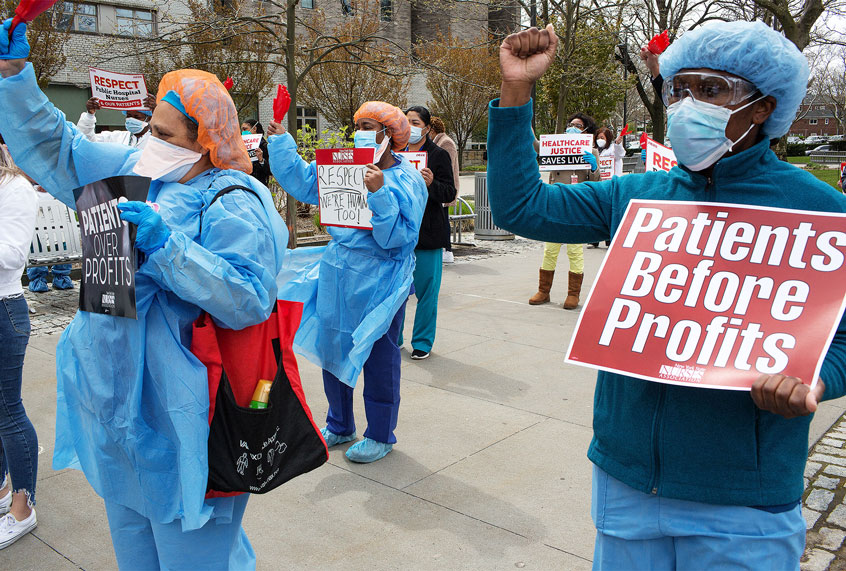Compared to non-union workers, union members have higher wages and smaller gender and racial wage disparities. Now, a new research paper finds that stronger labor unions have an anti-racist side effect: white union members feel less racial resentment against Blacks than their non-union counterparts.
The paper published in the American Journal of Political Science, called “Labor Unions and White Racial Politics,” was written by Professors Paul Frymer of Princeton University and Jacob Grumbach of the University of Washington. “Union membership reduces racial resentment toward African Americans,” they write. The reason, they believe, is partly because union leaders “need to recruit workers of color in order to achieve majority memberships in racially diversifying labor sectors” and therefore “have ideological and strategic incentives to mitigate racial resentment among the rank and file in pursuit of organizational maintenance and growth.”
Frymer and Grumbach note how union leadership increasingly forged alliances with civil rights groups starting with the advent of President Franklin Roosevelt’s New Deal in the 1930s, and that the tendency of a disproportionate number of unions to support civil rights causes has continued since that time.
“Although Trump received greater support from white union members than did earlier Republican presidential candidates, the increase was not unique to union members,” Frymer and Grumach also write. “Conditional on demographic covariates, union membership is negatively associated with Trump support.”
What has changed is that the Democratic Party — which had been aligned with union movements for over a century — has stopped focusing on forging a coalition between labor and civil rights groups based on mutual economic and social self-interest. Instead, Democrats have increasingly acted as if winning over working class white voters requires them to ignore the needs of racial minorities. This trend is exacerbated by how union membership has plummeted in the United States since labor began to decline in the late 1960s and early 1970s.
“Often you’ll hear what I think is a false dichotomy,” Grumbach told Salon. “The Democratic Party and left-of-center politics needs to choose between race or class. You hear this in electoral politics and punditry, the Democrats go after white working class (typically former union) workers or go for women and people of color, when actually the working class is overwhelmingly people of color, women, young people, what is considered the Democratic base.”
He added, “This paper shows that a neglect of the labor movement has helped further along this rise of white identity politics and the ability of Republicans to capture voters with white identity and resentment politics.”
Frymer echoed Grumach’s observation about the value of labor movements in helping to forge progressive coalitions.
“The labor movement is a very good intersecting organization,” Frymer explained. “I think the labor movement has been kind of lost since basically the late 1960s as an organizer of change that intersects class and race. The unions didn’t engage in this enough for many decades, and the unions had a lot of their own discrimination problems for many decades. But certainly, since the 1990s and in the 2000s, labor is really one of the largest, if not the largest civil rights organization in the country, and that needs to be recognized. More unions need to promote that and progressives need to recognize it. “
Grumbach also discussed why white working class voters can be persuaded to oppose their economic self-interest in order to hurt racial minorities.
“W. E. B. DuBois would call it the ‘psychological wage of whiteness,’ which has been a factor throughout American history,” Grumbach explained. “Why would poor whites support slavery, when that drives down the price of free white labor? Why would they support the end of reconstruction and the rise of the sharecropping economy, de facto slavery, going forward? And DuBois would say the psychological wage, that there’s this implicit contract that’s been pushed by he white capitalists to give working class white people the feeling that they are richer than they are because they get to feel superior to African Americans.”
He added, “To be not the lowest rung on the ladder appeared more appealing than lifting up the entire bottom of the ladder.”
Grumbach also talked to Salon about his personal history and how that influenced his interest in the intersections between labor political and civil rights.
“I’ve long been interested in labor issues, particularly the intersection of class and race in the US,” Grumbach explained. “Growing up in a city, you see that people marginalized by race and class tend to be excluded from health insurance and the US has a pretty weak welfare state. All these things at a young age were pretty obvious.” He also pointed to his family background, telling Salon that his maternal grandfather “was the editor of the Chicago Defender, a prominent black newspaper, and was really interested in and would report on the fights to integrate labor unions, and really saw an interracial labor movement as the key to civil rights and key to economic progress.”

